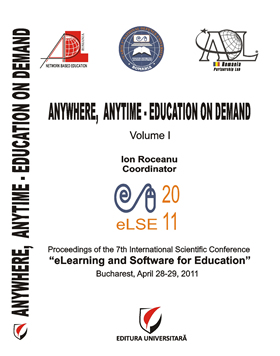COMPUTER BASED-ASSESSMENT MEETING THE PROGRAM EVALUATION STANDARDS. ROMANIAN EXPERIENCE WITH BLACKBOARD TM.
COMPUTER BASED-ASSESSMENT MEETING THE PROGRAM EVALUATION STANDARDS. ROMANIAN EXPERIENCE WITH BLACKBOARD TM.
Author(s): Manuela EPURE, Adela Mihaela Taranu, Nadia Mirela FloreaSubject(s): Education
Published by: Carol I National Defence University Publishing House
Keywords: CBA; SWOT analysis; meta-evaluation; ethical reflection.
Summary/Abstract: Using the BlackboardTM e-learning platform as a learning and assessment tool for five years already, brought us to the point of reevaluating and rethinking the evaluation process, shifting from traditional methods to the new and modern ones. A SWOT analysis was undertaken in order to reveal the main coordinates of the evaluation process in terms of advantages, disadvantages, opportunities and threats, while targeting as a final outcome a new approach and a new strategy, not only for the teaching staff, but mainly for the student’s benefit. This paper aims to identify the functions of the Blackboard computer-based (CB) assessment, from the perspective of The Program Evaluation Standards (Stufflebeam, 1999), using as benchmarks the variables included in the Meta-evaluation Checklist. This checklist was developed by the Joint Committee Program Evaluation Standards for performing final, summative meta-evaluations; it incorporates a wide range of standards (30 items) as follows: Utility (7) Feasibility (3), Propriety (8), Accuracy (12). In this context, we attempt to demonstrate why the "Ethical Reflection" (Huotari, 2010), as a dimension of the evaluation, has become really important nowadays. Accordingly, the four steps/actions described by Huotari – Resources/Being, Interaction/Regeneration, Process /Doing, Outcomes (Effects)/Having – may be examined from the perspective of rethinking and revaluating assessment actions, at a superior level through direct and indirect connective actions. Moreover, the paper also intends to capture the long-term effects on the student’s personal development as a result of the evaluative actions supported by Blackboard. Understanding such effects is indispensable in terms of designing an adequate program for monitoring and training the evaluators, in the benefit of a more tailored CB assessment.
Journal: Conference proceedings of »eLearning and Software for Education« (eLSE)
- Issue Year: 7/2011
- Issue No: 01
- Page Range: 441-451
- Page Count: 11
- Language: English

